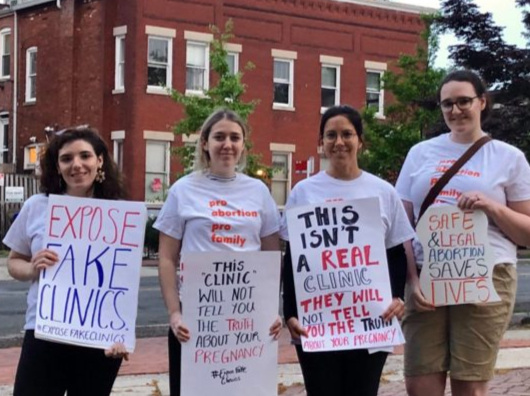This project received a Seed Support Grant from Abortion Conversation Projects to reduce abortion stigma.
“Abortion Conversation Projects gave us funding that allowed us to print bold, positive, abortion-forward T-shirts that we use to motivate and draw activists together as we protest abortion opponents. We were pleased and grateful for this opportunity.”
–Erin Matson, ReproAction
Reproaction has a deep commitment to direct action, and we fully believe in its ability to make real, long-lasting change. Direct action is a meaningful way to build community, spread information, and challenge abortion opponents. If you want to stand up for abortion access and shine a light on ‘pro-life’ hypocrisy, you should protest outside of your local fake clinic.
You may remember anti-abortion fake clinics from when they took center stage during the Supreme Court case, NIFLA v. Becerra. ‘Crisis pregnancy centers’ are anti-abortion centers that, despite marketing themselves as real reproductive health centers, exist to deter women and people from seeking abortion care. There are roughly 2,700 fake clinics in the United States, outnumbering real abortion clinics. Despite many fake clinics presenting themselves as innocuous low budget operations, anti-abortion fake clinics are often affiliated with larger networks that provide funding and resources.
Fake clinics are notorious for employing a variety of scare tactics, including giving people misinformation about how far along their pregnancy is, lying about what is involved in an abortion procedure, and shaming people for their sexual history. Unlike abortion clinics, fake clinics are unregulated in most states, and how they use their funds, some of which is taxpayer money, is often unknown.
In a narrow 5-4 decision, the Supreme Court ruled in favor of fake clinics in June 2018. Despite the setback, activists have continued to spread the word about fake clinics through public education and direct action.
Reproaction activists spread the word about anti-abortion fake clinics in Virginia and Washington, D.C. Activists created flyers with information about fake clinics and resources for people seeking abortion care. In Fredericksburg, Virginia, Reproaction worked with University of Mary Washington students to organize a protest outside of a fake clinic that was known for preying on students at their campus. It didn’t take long for abortion opponents to notice and try to interact with the large group of activists outside. Much to our surprise, people in the neighborhood came out of their houses to talk to activists, learn more and support our action.
Taking direct action outside of a fake clinic is a great way to have conversations about abortion and access in your community. It also moves conflict with opposition from the doors of abortion clinics to their doors. At all of our actions, activists sported our new ‘pro-abortion, pro-family, pro-justice’ T-shirts designed to catch attention and boldly spread the message of support for abortion and reproductive justice. As this message encourages conversation, activists also successfully led conversations with members of the community about access to reproductive healthcare. Compiling community resources in an accessible format, such as a flyer, helped activists spread the word about where people can access real abortion care and find unbiased local resources for information about reproductive health.
As activists, it is our responsibility to ensure that people seeking abortion care can do so without fear, shame or intimidation. It is more important than ever that we mobilize for abortion access in this country and at the same time have conversations in your community.
Ready to learn more and take action?
Identify anti-abortion fake clinics near you with Reproaction’s Fake Clinic Database!
Learn more about the tactics fake clinics use with our Taking Bold Action Against Crisis Pregnancy Centers Toolkit!
Spread the word about fake clinics with Reproaction’s Your Need-to-Know on Crisis Pregnancy Centers Fact Sheet.

